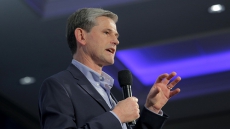OTTAWA - The Canadian Armed Forces saw its top ranks shuffled Monday as former special-forces commander Lt.-Gen. Mike Rouleau was tapped to become the military's sixth second-in-command in four years, forcing several other moves down the line.
Rouleau will take over this summer from Lt.-Gen. Jean-Marc Lanthier, who surprised many last week when he announced his plan to retire after only a year as vice-chief of the defence staff.
Lanthier was named vice-chief last July and it was hoped at the time that he would provide stability after years of upheaval starting with Vice-Admiral Mark Norman's suspension as second-in-command in January 2017.
Rouleau is currently commander of the Canadian Joint Operations Command, meaning he is responsible for managing all Canadian military operations in the country as well as overseas.
He is also widely seen as one of the top contenders to eventually succeed Gen. Jonathan Vance as chief of the defence staff.
"It will be a great honour for me to lead as second in command of the Canadian Armed Forces, an institution I deeply respect and (which) is embodied by a military force and defence team that is second to none," Rouleau said in a statement on Monday.
He added that he aimed to "further the work of my predecessors to move the organization forward by capitalizing on our strengths as a highly professional, capable fighting force that is empowered by the trust of Canadians."
The turnover in vice-chiefs of the defence staff has been of concern to many observers given the importance of the position, which is responsible for much of the day-to-day financial oversight and management of the Canadian Armed Forces.
Rouleau joined the military in 1985 before leaving to become an Ottawa police officer in 1999. However, he rejoined the Forces following the 9/11 terrorist attacks and rose through the ranks to command Canada's special forces from 2014 to 2018.
In 2016, Rouleau pleaded guilty and was fined $2,000 for mistakenly firing his rifle while loading it during a visit to the front lines in Iraq. No one was injured, but he accepted full responsibility, saying at the time "the only acceptable standard of care with a weapon is error-free."
While Rouleau brings a great deal of experience with military operations, the vice-chief position is focused on managing the Canadian Armed Forces as a corporate entity, due to its focus on administration and finances.
However, "despite not having really worked in the space, he's always been someone who struck me as getting how the fiscal machine worked," said David Perry, vice-president of the Canadian Global Affairs Institute and one of Canada's top experts on military spending.
"So I've always counted him amongst the senior officers that I thought understood that better than a lot of their peers."
Rouleau's appointment was one of several announced by Vance on Monday, which included appointing Lt.-Gen. Christopher Coates, the deputy commander of the North American Aerospace Defence Command in Colorado Springs, Colo., to take over Rouleau's current position.
Maj.-Gen. Alain Pelletier, who currently commands 1 Canadian Air Division in Winnipeg, is being promoted and asked to take over Coates's role at Norad.
Vance also made first deployment of a Canadian general, Brig.-Gen. Kevin Whale, to the United States Air Force's new space command. The move reflects the growing importance of space in Canadian and North American military operations.
Following the changes, Canada will have a total of 136 generals and admirals, of whom 14 — or just more than 10 per cent of the total — will be women.
